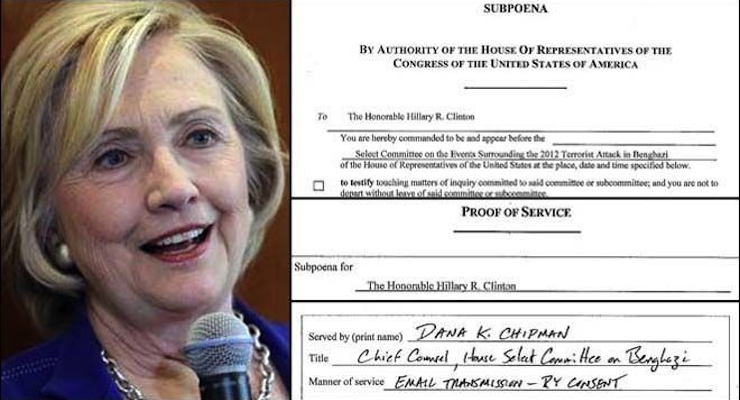

Hillary Clinton, left, said in an interview with CNN that she was not under a subpoena to hand over emails she had deleted. Benghazi Select Committee Chair Trey Gowdy, R-S.C., produced that subpoena, right.
When Thomas E. McNamara arrived in Colombia as U.S. ambassador in 1988, he encountered a hit list issued by narco-terrorist Pablo Escobar. “I was No. 1,” he recalls. “Ambassadors tend to get that kind of attention.”
On a different mission to confer with Lebanese government officials, McNamara was greeted with “a welcome-to-Beirut mortar and artillery barrage,” which landed in the parking lot outside the building. “We picked up papers and went to the basement, where there was a secure bunker,” McNamara, later named ambassador-at-large for counterterrorism, told me.
No, being a professional foreign service officer is not all about cocktails in Paris, London and Rome. In fact, little of it is. Most members of the U.S. foreign service serve in harsh parts of the world. And much of their job centers on going into dangerous countryside where they’re exposed to some who would do them harm.
Since World War II, at least eight ambassadors have died from hostile action, as opposed to three flag officers — that is, generals and admirals. From 1979 to 2009, some 96 American foreign service members died in attacks.
Which brings us to the Sept. 11, 2012, murders of Ambassador J. Christopher Stevens and three other Americans in Benghazi, Libya. The attacks on our diplomatic compound in Benghazi were a tragedy for everyone, but to professional foreign service officers, the politicization of them was a disgrace.
Blaming then-Secretary of State Hillary Clinton for security lapses in Benghazi is outrageous, McNamara said, emphasizing that he never worked for her. The secretary of state is not personally involved in such matters.
“Those congressmen wouldn’t give a damn about the death of Americans in Benghazi if they didn’t think they could make political capital out of it,” McNamara angrily added.
Many Americans still regard formal diplomacy as a frilly European thing. That’s partly a hangover from the 18th and 19th centuries, when only the wealthy were sent to foreign posts because the pay was so low. Since then, the foreign service has become a meritocracy, dependent on tough entrance exams.
A new PBS documentary, “America’s Diplomats,” tries to explain the history and mission of the foreign service.
“It’s easy to understand the 101st Airborne when they go out and they win a big battle for America,” former Secretary of State James Baker says in the film. “It’s not as easy to understand the battles that are won every day in the field by America’s diplomats abroad.”
Thousands of those battles involve helping Americans do business abroad. Example: Some years ago, the European Union issued new rules governing the size of motorcycle engines. Purportedly intended to make motorcycling safer, the regulations had the effect of freezing out one U.S. manufacturer, Harley-Davidson. American diplomats who had developed relationships with European officials negotiated for some minor technical changes in the rules. Harley was in.
And there were major humanitarian breakthroughs. As a special envoy, the late Richard Holbrooke led a tireless campaign to end the bloodshed in Bosnia. When Serbian leader Slobodan Milosevic wouldn’t let Holbrooke and his team securely land in Sarajevo, the group drove a perilous mountain road to get there. One vehicle transporting team members rolled down a mountainside. All aboard died.
But American diplomacy eventually won out. The 1995 Dayton Accords ended Europe’s worst human calamity since World War II.
Many worry that the political circus around Benghazi will deter American officials from taking risks in the name of diplomacy. That would deny America its first line of defense. The best way to honor Stevens would be as a patriot-diplomat who accepted risk in service to his country.






